Documentos
5 Buddhas da Meditação
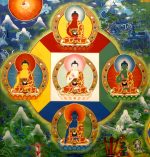 Os Cinco Budas da Meditação (do sânscrito ध्यानि , transl. Dhyani, “concentração”) são os budas principais de cada uma das cinco famílias do budismo tibetano.
Os Cinco Budas da Meditação (do sânscrito ध्यानि , transl. Dhyani, “concentração”) são os budas principais de cada uma das cinco famílias do budismo tibetano.
Os Cinco Budas são:
- Vairochana (ou Samanthabadra), da família Buda;
- Ratnasambhava, da família Ratna (Jóia);
- Amitaba, da família Pema (Lótus);
- Akshobya, da família Vajra (Diamante);
- Amogasidi, da família Karma.
A cada família, é associada uma cor, um animal, um dos cinco elementos e uma direção. Cada buda possui uma consorte, um tipo de sabedoria e está associado a um dos agregados que compõem nosso mundo visível.
Dhyani Buddhas
 Os Cinco Budas da Meditação (do sânscrito ध्यानि , transl. Dhyani, “concentração”) são os budas principais de cada uma das cinco famílias do budismo tibetano.
Os Cinco Budas da Meditação (do sânscrito ध्यानि , transl. Dhyani, “concentração”) são os budas principais de cada uma das cinco famílias do budismo tibetano.
Os Cinco Budas são:
- Vairochana (ou Samanthabadra), da família Buda;
- Ratnasambhava, da família Ratna (Jóia);
- Amitaba, da família Pema (Lótus);
- Akshobya, da família Vajra (Diamante);
- Amogasidi, da família Karma.
A cada família, é associada uma cor, um animal, um dos cinco elementos e uma direção. Cada buda possui uma consorte, um tipo de sabedoria e está associado a um dos agregados que compõem nosso mundo visível.
4 Incomensuráveis
 As Quatro Qualidades Incomensuráveis – (Tib. ཚངས་པའི་གནས་བཞི་, Wyl. tshangs pa’i gnas bzhi)
As Quatro Qualidades Incomensuráveis – (Tib. ཚངས་པའི་གནས་བཞི་, Wyl. tshangs pa’i gnas bzhi)
- Equanimidade, (Tib. བཏང་སྙོམས་, tangnyom) desejo de que todos os seres sejam libertados do sofrimento, sem nenhuma atitude de apego e aversão;
- Amor, (Tib. བྱམས་པ་, jampa) desejo de que todos os seres possam ser felizes e de que tenham as causas da felicidade.
- Compaixação, (Tib. སྙིང་རྗེ་, nyingjé) desejo de que todos os seres possam ser livres do sofrimento de livres da causa do sofrimento.
- Alegria, (Tib. དགའ་བ་, gawa) desejo de que todos os seres possam ser felizes e de que a felicidade possa sempre aumentar.
Como Praticar: em edição
1. Equanimity
Initially, we need to train the mind in equanimity. The way in which we are currently attached to our friends and aggressive towards our enemies is a fault which comes from failing to examine the situation thoroughly. In reality, today’s so-called “enemies” have, in the course of our many past lifetimes, been dear friends who have helped us enormously. And those whom we currently consider to be our “friends” have been our enemies in past lifetimes, having caused us considerable harm.
The Noble Katyayana said:
- “He eats his father’s flesh, while striking his own mother,
- And cradles in his lap the enemy he killed;
- The wife is gnawing at her husband’s bones.
- Samsara is enough to make you laugh out loud!
Recognize that this bias, which currently causes us to see some people as our friends and others as our enemies, is a result of having fallen under the power of ignorance. Train your mind until you feel a benevolent attitude, like the one you have now for your presentmother and father, for all beings, especially your “enemies” and those who create obstacles for you.
2. Love
Then, since these beings have shown you exactly the same kindness as your current parents, cultivate love for them all and wish them happiness in order to repay their past kindness. Train yourself to be like parents caring for a small child, or a mother bird looking after her young, so that all your actions of body, speech and mind are undertaken only to ensure the happiness and well-being of others.
3. Compassion
Cultivate compassion, which is the wish for beings to be freed from suffering. Imagine a prisoner who is about to be executed, or an animal at the slaughterhouse, and put yourself in their position, or imagine that they are your own dear mother. When you experience an unbearably intense feeling of compassion for them, consider that although the one experiencing such suffering is not actually your mother or father in this lifetime, he or she has been your mother and father countless times throughout the course of your innumerable lifetimes. Practise cultivating this compassion until you feel exactly the same compassion for all sentient beings as you do for your own mother and father.
4. Joy
Whenever you see someone who is wealthy and powerful, and apparently enjoying all the pleasures of the higher realms, or whenever you see someone who possesses the qualities of scriptural learning and realization, do not feel resentful or envious of them, even if you consider them to be an enemy. Instead, feel joyful and make the wish that their riches and power increase even further. And pray that all sentient beings may experience the same kind of good fortune. Train your mind in this way, again and again.
If, when you practise training the mind in these four immeasurables, you proceed gradually—first considering your own parents; then including your friends and relatives; and finally extending the practice to your enemies—you will come to feel the same love and compassion for your enemies as for your parents. This is the measure of your mind training.
As Quatro Qualidades Incomensuráveis
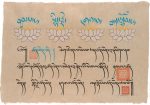 As Quatro Qualidades Incomensuráveis – (Tib. ཚངས་པའི་གནས་བཞི་, Wyl. tshangs pa’i gnas bzhi)
As Quatro Qualidades Incomensuráveis – (Tib. ཚངས་པའི་གནས་བཞི་, Wyl. tshangs pa’i gnas bzhi)
- Equanimidade, (Tib. བཏང་སྙོམས་, tangnyom) desejo de que todos os seres sejam libertados do sofrimento, sem nenhuma atitude de apego e aversão;
- Amor, (Tib. བྱམས་པ་, jampa) desejo de que todos os seres possam ser felizes e de que tenham as causas da felicidade.
- Compaixação, (Tib. སྙིང་རྗེ་, nyingjé) desejo de que todos os seres possam ser livres do sofrimento de livres da causa do sofrimento.
- Alegria, (Tib. དགའ་བ་, gawa) desejo de que todos os seres possam ser felizes e de que a felicidade possa sempre aumentar.
Como Praticar: em edição
1. Equanimity
Initially, we need to train the mind in equanimity. The way in which we are currently attached to our friends and aggressive towards our enemies is a fault which comes from failing to examine the situation thoroughly. In reality, today’s so-called “enemies” have, in the course of our many past lifetimes, been dear friends who have helped us enormously. And those whom we currently consider to be our “friends” have been our enemies in past lifetimes, having caused us considerable harm.
The Noble Katyayana said:
- “He eats his father’s flesh, while striking his own mother,
- And cradles in his lap the enemy he killed;
- The wife is gnawing at her husband’s bones.
- Samsara is enough to make you laugh out loud!
Recognize that this bias, which currently causes us to see some people as our friends and others as our enemies, is a result of having fallen under the power of ignorance. Train your mind until you feel a benevolent attitude, like the one you have now for your presentmother and father, for all beings, especially your “enemies” and those who create obstacles for you.
2. Love
Then, since these beings have shown you exactly the same kindness as your current parents, cultivate love for them all and wish them happiness in order to repay their past kindness. Train yourself to be like parents caring for a small child, or a mother bird looking after her young, so that all your actions of body, speech and mind are undertaken only to ensure the happiness and well-being of others.
3. Compassion
Cultivate compassion, which is the wish for beings to be freed from suffering. Imagine a prisoner who is about to be executed, or an animal at the slaughterhouse, and put yourself in their position, or imagine that they are your own dear mother. When you experience an unbearably intense feeling of compassion for them, consider that although the one experiencing such suffering is not actually your mother or father in this lifetime, he or she has been your mother and father countless times throughout the course of your innumerable lifetimes. Practise cultivating this compassion until you feel exactly the same compassion for all sentient beings as you do for your own mother and father.
4. Joy
Whenever you see someone who is wealthy and powerful, and apparently enjoying all the pleasures of the higher realms, or whenever you see someone who possesses the qualities of scriptural learning and realization, do not feel resentful or envious of them, even if you consider them to be an enemy. Instead, feel joyful and make the wish that their riches and power increase even further. And pray that all sentient beings may experience the same kind of good fortune. Train your mind in this way, again and again.
If, when you practise training the mind in these four immeasurables, you proceed gradually—first considering your own parents; then including your friends and relatives; and finally extending the practice to your enemies—you will come to feel the same love and compassion for your enemies as for your parents. This is the measure of your mind training.
Dharmachakra
 Roda do Dharma ou Dharmachakra Sanskrit: Dharmacakra; Tibetan: ཁོར་ལོ, Wylie: khor lo): representa os ensinamentos do Buda e sua energia de movimento e transformação espiritual.
Roda do Dharma ou Dharmachakra Sanskrit: Dharmacakra; Tibetan: ཁོར་ལོ, Wylie: khor lo): representa os ensinamentos do Buda e sua energia de movimento e transformação espiritual.
“Roda do Dharma” é um símbolo representando o dharma, os ensinamentos do Buddha sobre o caminho para a iluminação. É também algumas vezes traduzida como roda da doutrina ou roda da lei.
É um dos oito símbolos auspiciosos.
Dzambala
 Dzambala (também conhecido como Jambala) é o Deus da Riqueza e um membro da Família Ratna. Na mitologia hindu , Dzambala é conhecido como Kubera .
Dzambala (também conhecido como Jambala) é o Deus da Riqueza e um membro da Família Ratna. Na mitologia hindu , Dzambala é conhecido como Kubera .
Dzambala é um Bodhisattva da riqueza e prosperidade material e espiritual.
Amitayus
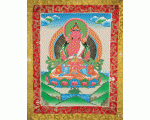 Amitayus (Skt. Amitāyus , Tib. ཚེ་ དཔག་ མེད་ , Tsepakmé , Wyl. Tshe dpag med ), ‘O Buda da Vida Sem Restrições ‘ – um aspecto sambhogakaya da Amitabha , particularmente associado à longevidade. Ele é representado principalmente sentado e segurando nas mãos um vaso contendo o néctar da imortalidade. Amitayus é também uma das três divindades de longa vida .
Amitayus (Skt. Amitāyus , Tib. ཚེ་ དཔག་ མེད་ , Tsepakmé , Wyl. Tshe dpag med ), ‘O Buda da Vida Sem Restrições ‘ – um aspecto sambhogakaya da Amitabha , particularmente associado à longevidade. Ele é representado principalmente sentado e segurando nas mãos um vaso contendo o néctar da imortalidade. Amitayus é também uma das três divindades de longa vida .
Karma
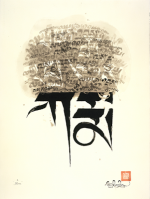 Karma – O peso de ações negativas passadas é sempre cobrado pela lei do Karma.
Karma – O peso de ações negativas passadas é sempre cobrado pela lei do Karma.
Igualmente, quaisquer ações positivas acumuladas resultarão na fruição do Karma positivo.
Não há uma regra de tempo para dizer quando o Karma bom ou mau amadurecerá, além de todas as causas e condições relevantes se juntarem para que esse “karma” particular se manifeste.
Geralmente, o Karma pode ser definido como “karma pessoal” e “karma coletivo”:
“pessoal” como resultado de nossa própria intenção e ação,
“coletivo” como resultado de um condicionamento unificado, como uma intenção e ação coletiva, de uma família, cidade, nação como um todo.
Sonam Chokter
སེར་མོ་བསོད་ནམས་སྟོབས་བསྐྱེད།
ཨོཾ་ཏཱ་རེ་ཏུ་ཏྟཱ་རེ་ཏུ་རེ་མ་ཧཱ་པུ་ཎྱེ་སྭཱ་ཧཱ།
OṀ TĀRE TUTTĀRE TURE MAHĀ PUṆYE SVĀHĀ
A terceira Tara é chamada Tara Sonam Chokter, ou Sonam Tobche. Sonam significa “mérito”, mas é frequentemente traduzido como “boa fortuna, prosperidade” ou mesmo “sorte”. Tob é a palavra tibetana que significa “poder, habilidade”, e che significa “aumentar”. Aproximadamente, “libertadora que aumenta o poder da prosperidade e da capacidade de mérito” é o significado da palavra do nome deste Tara. Outros nomes muito populares para ela são Vasudhari em sânscrito e Norjunma em tibetano. O efeito de praticar nesta Tara de prosperidade não é apenas que possamos adquirir riqueza externa ou material, mas também que desenvolveremos riqueza interna ou espiritual. Ao praticar em Tara Sonam Tobche, podemos desenvolver ambas as formas de riqueza.
Sonam Tobche está oferecendo todas as virtudes, todas positividades. Oferecer é sua principal atividade. Sua cor é amarela e azul, esverdeada, e ela está segurando uma cintamani em cima de sua flor.
Yangchenma
Yangchenma (dbyangs can ma; Skt. Sarasvati) – para conhecimento e sabedoria.
བློ་གཏེར་དབྱངས་ཅན་མ།
ཨོཾ་ཏཱ་རེ་ཏུ་ཏྟཱ་རེ་ཏུ་རེ་པྲཛྙཱ་ཧྲཱིཾ་ཧྲཱིཾ་སྭཱ་ཧཱ།
OṀ TĀRE TUTTĀRE TURE PRAJÑĀ HRĪṂ HRĪṂ SVĀHĀ
A segunda emanação de Tara é chamada de Loter Yangchenma. Loter significa “doador de conhecimento”. O termo tibetano Yangchenma significa “melodioso, o que possui melodias” ou “fonte de melodias”. Então, podemos chamá-la Drolma Loter Yangchenma: Libertador Melodioso, Fonte da Sabedoria. Em sânscrito, ela é chamada de Saraswati e Vajrasaraswati.
Yangchenma, Sarasvati, também chamado tönshalma em tibetano (tön significa outono e shal significa rosto), o que significa que ela tem o rosto de cem luas completamente cheias de outono. Ela é branca, brilhando intensamente com a luz completamente difundida de uma multidão de milhares de estrelas. Ela dissipa a escuridão da ignorância com a força de sua luminosidade. Em cima do lótus na sua esquerda há a sílaba hri. (Rangu Tulku)

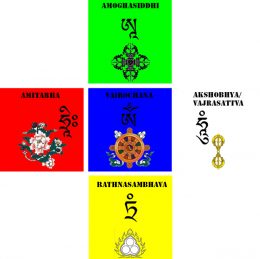
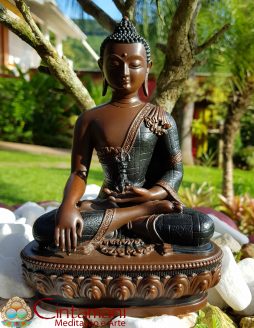
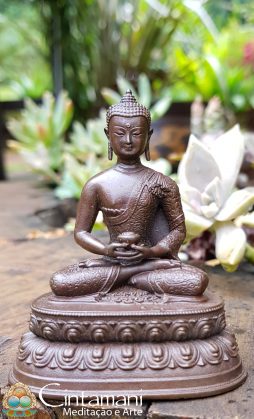
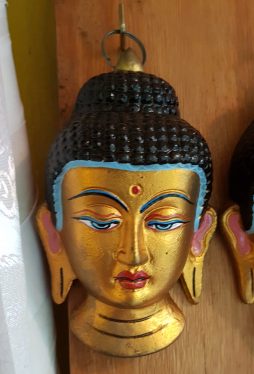


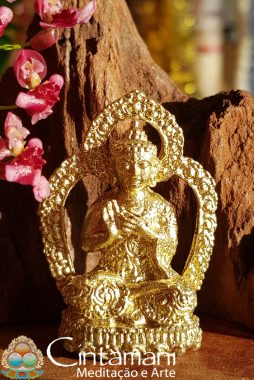
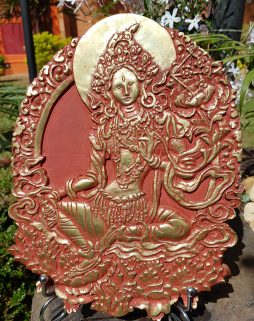
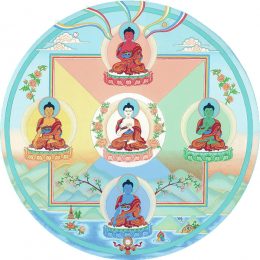
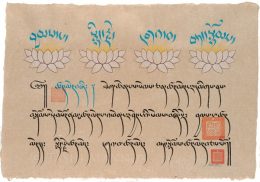




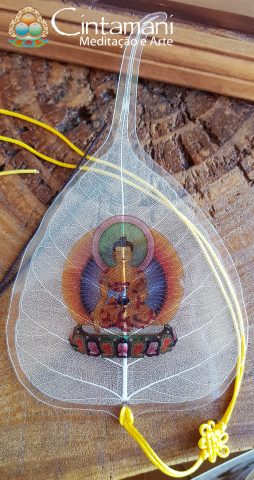

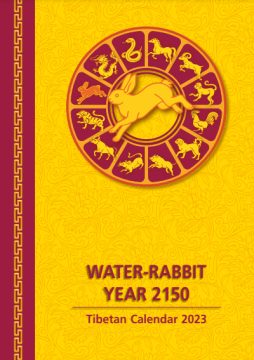





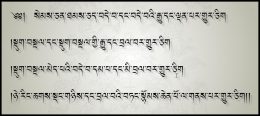
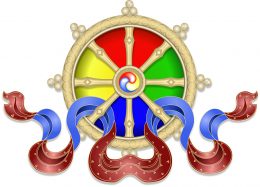
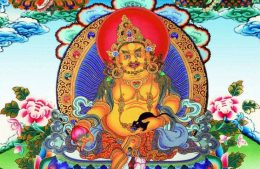


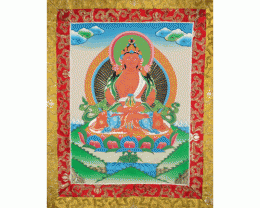
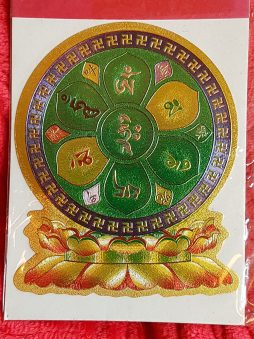




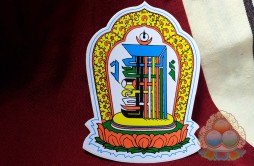


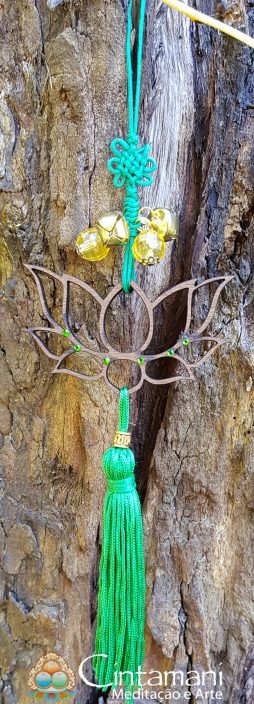



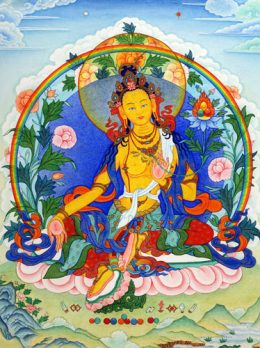
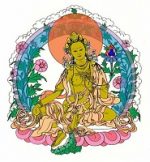
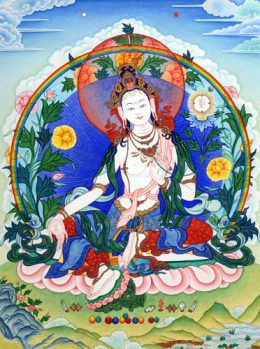
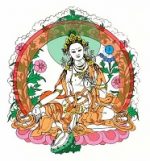
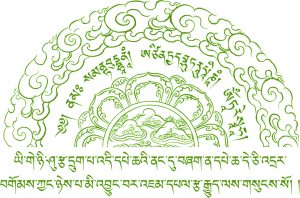
 Cintamani - Meditação e Arte - Copyright 2020 - Todos os direitos reservados.
Cintamani - Meditação e Arte - Copyright 2020 - Todos os direitos reservados.